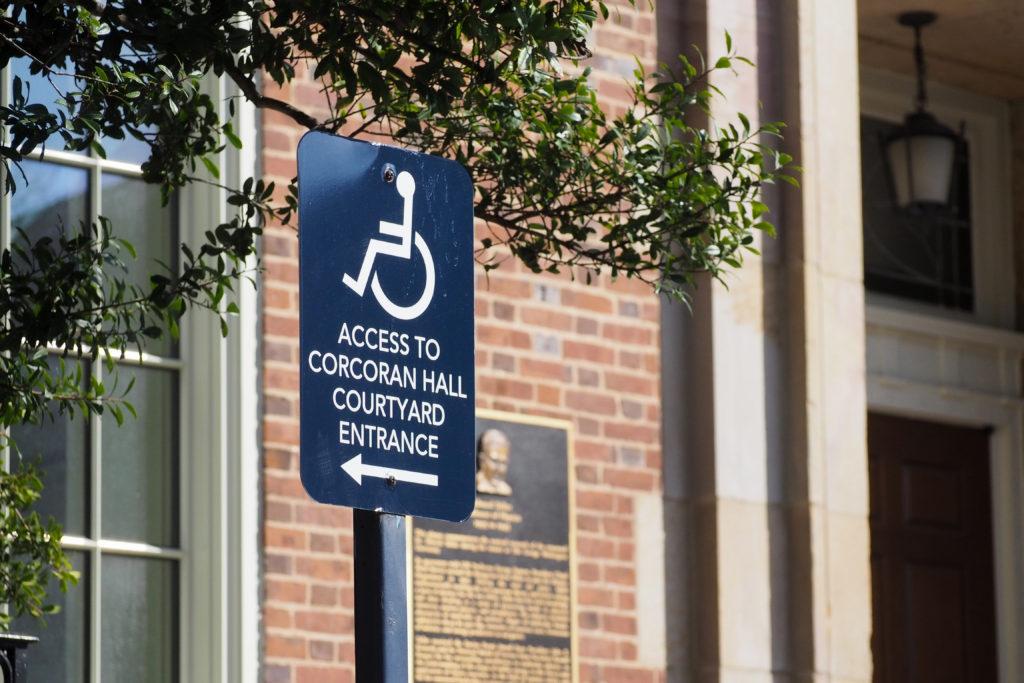GW has until April 1 to make its online content universally accessible following a disability discrimination complaint three years back.
The U.S. Department of Education Office for Civil Rights launched an inquiry into the accessibility of GW’s websites in April 2017 and closed the investigation in June 2018 after officials resolved to update its websites with accessibility features by this April. University spokeswoman Crystal Nosal said the Office of Ethics, Compliance and Privacy, Disability Support Services and Information Technology have made “significant” progress in increasing web accessibility but declined to say when all websites will be updated with the necessary features.
“The University is committed to providing an inclusive and welcoming environment that is accessible for everyone, including people with disabilities,” Nosal said in an email. “Digital accessibility is an essential part of a positive experience and a critical component of the University’s academic environment for students with disabilities, as well as for faculty, staff and visitors who have disabilities.”
The complaint alleged that GW webpages lacked accessibility tools like screen reader compatibility and color contrast for users with disabilities, especially visual impairments. The complaint stated that individuals with vision and print disabilities and motor impairments or those deaf or hard of hearing would have difficulty navigating websites lacking accessibility features.
After the OCR publicly disclosed the investigation in 2018, officials formed a task force to examine website accessibility issues like lacking tab navigation, video captioning and text photo captions. The department closed the investigation in March 2018, and officials signed an agreement mandating that GW implement a new plan to improve digital accessibility.
The plan included measures like reevaluating current resources and instituting staff training to ensure all online content is accessible. The education department required GW to submit a report to the OCR demonstrating that officials satisfied the terms of the resolution by April 1.
GW met the ED’s first deadline to solidify the plan in January 2019. Nosal declined to say when officials anticipate all University websites will be completely accessible.
She said officials now use methods like Siteimprove – an accessibility-monitoring software system – to monitor online accessibility issues as websites update. She said GW requires third-party technology service partners and products to ensure University services and products maintain accessibility over time.
Nosal said all schools and divisions now must account for accessibility when purchasing new online products and services. She added that officials established a “mechanism” for accessibility feedback and requests and developed a Digital Accessibility Committee to oversee accessibility improvement efforts.
Nosal said officials will continue “remediating” existing online content and instituting procedures for ensuring future online content accessibility. She said officials instituted a Web and Digital Content Accessibility Policy last spring that “affirms” GW’s commitment to providing accessible online content to students.
“Becoming fully digitally accessible is a significant and continuous undertaking as technology is always evolving and website content and applications are continually updated,” she said.
Accessibility experts said universities should train staff about website creation to ensure future online content includes accessible features.
Cyndi Rowland, the associate director for the Utah State University Center for Persons with Disabilities, said the ED now less strictly enforces deadlines for satisfying resolution agreement mandates under Secretary of Education Betsy DeVos’ leadership. She said the current ED does not check in on universities’ progress in fulfilling resolution agreement mandates in many discrimination cases.
“There’s a certain date where they’re supposed to have certain things in place, and nobody is looking,” Rowland said.
She said failure to comply with the terms of a resolution agreement often compels complainants to sue educational institutions for discrimination. Rowland said a university’s failure to take all necessary measures to correct discriminatory behavior indicates that the institution is “willfully neglecting” complainants’ civil rights.
“I would caution, any institution, anybody, I don’t care who you are – if you had an OCR complaint before, take it seriously, do engage in the due diligence and stay on the timeline, because if not, the next knock on the door is from an attorney,” she said.
Nancy Horton, an information specialist for the Mid-Atlantic ADA Center, said universities should implement protocols to proactively ensure the accessibility of online content. Horton added that officials should consult experts in university disability student services offices to identify how best to make “legacy material” – old website content – accessible to all.
“You want to make sure that if you’ve got old stuff to fix, then you have to deal with that,” Horton said. “But you also want to make sure that, as new content is going up, that it’s designed to be accessible from the outset.”
Keri Gray, the senior director of stakeholder engagement and strategic communications at the American Association of People with Disabilities, said disability student services officials should facilitate conversations between academic departments and university offices about how best to implement accessibility measures like screen-reader compatibility, alternate text captions for photos and video captioning.
“Disability services can be a place to just lay a foundation for having this conversation about being inclusive and understand disabilities 101,” Gray said.




